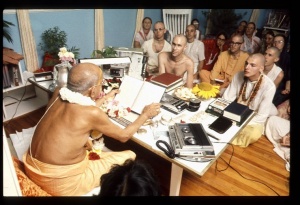CC Adi 15.10 (1975)

A.C. Bhaktivedanta Swami Prabhupada
Below is the 1996 edition text, ready to be substituted with the 1975 one using the compile form.
TEXT 10
- śacī kahe,—nā khāiba, bhāla-i kahilā
- sei haite ekādaśī karite lāgilā
SYNONYMS
śacī kahe—mother Śacī said; nā khāiba—I shall not take; bhāla-i kahilā—You have said very nicely; sei haite—from that day; ekādaśī—Ekādaśī day; karite lāgilā—began to observe.
TRANSLATION
Mother Śacī said, “You have spoken very nicely. I shall not eat grains on Ekādaśī.” From that day, she began to observe fasting on Ekādaśī.
PURPORT
It is a prejudice among smārta-brāhmaṇas that a widow must observe fasting on Ekādaśī but a woman who is sa-dhava—who has her husband—should not. It appears that before Lord Caitanya’s request, Śacīmātā, being sa-dhava, was not observing Ekādaśī. Śrī Caitanya Mahāprabhu, however, introduced the system that a woman, even if not a widow, must observe the Ekādaśī day and must not touch any kind of grains, even those offered to the Deity of Viṣṇu.